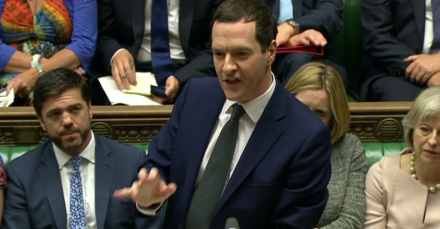
The UK has always punched above its weight in science and innovation. But George Osborne has turned his back on our proud record, and is putting future scientific and economic success at risk.
Treasury support for the UK science base is an absolutely critical issue – because of the pivotal role of scientific research in driving innovation and productivity, and so its importance to building the high-tech, high-skills economy we need.
It is an issue at the heart of the question facing our country today – the need now for strategic and sustained investment to secure our future prosperity. Independent academic analysis suggests that every pound spent by the UK government on research and development raises private sector R&D output by 20p per year in perpetuity. Even this understates the full multiplier effects of public investment in science and research, because of the impact of government investment in stimulating additional private sector investment.
The gap between what Osborne says and what he does is worrying. He says he is proud of the success of Catapult centres – which we of course support, for these were an initiative of the last Labour government. But the support they have received under this government falls well short of that that of similar schemes in France and Germany, for example, which receive over ten times as much public support.
In his 2010 Spending Review Osborne boasted that he was protecting the science budget. But he actually cut capital investment over the next five years. And the “protection” was only in cash terms – inflation ate up around £1bn of its value over the past five years.
The last Labour government established a target to increase UK R&D investment (public and private) to 2.5% of GDP by 2014. The latest official figures from the ONS show total R&D expenditure at 1.67% of GDP. New global players are moving forward quickly, with China increasing its R&D by 15% in 2010, and South Korea doubling its expenditure between 2003 and 2011.
A recent PWC report is clear that the UK lacks the skilled workforce and the necessary companies to complement and drive R&D. As a result the UK is rapidly being overtaken by the US, and much of Asia.
UK labour market trends have confirmed the importance of technology in creating new jobs. But we face a worrying “scale up gap” – too many small businesses struggle to access the skills and support they need to grow into global players. Just two of the world’s top 20 companies for R&D spend are located in the UK – both of them pharmaceutical companies. We need long-term leadership from Government.
While standard figures show that the majority of aggregate R&D investment is undertaken by the private sector, this obscures the fact that the public sector delivers most of the “R” so that the private sector can concentrate on the “D”.
For Britain to be competitive it is essential that both public and private R&D not only rise, but work more closely together. It is not only about increased investment, but also about greater strategic focus and closer partnership and collaboration. These arguments have been powerfully made by Professor Mariana Mazzucato and other distinguished economists. We need a smarter, more strategic state, not a smaller one as Osborne is ideologically fixated on.
It’s vital that Osborne supports science and innovation in this month’s Spending Review. If this Government won’t listen, then the Labour Party will.
Seema Malhotra MP is Shadow Chief Secretary to the Treasury





More from LabourList
‘I spent years telling workers the law couldn’t help them – that has changed’
Josh Simons resigns as Cabinet Office minister amid investigation
‘After years of cuts, Labour’s local government settlement begins to put things right’